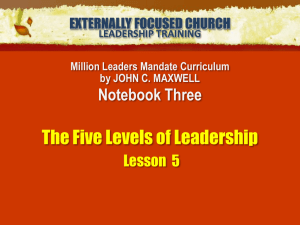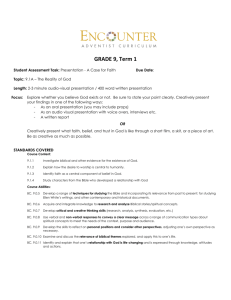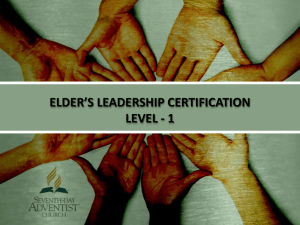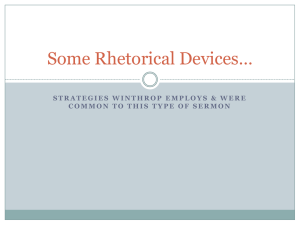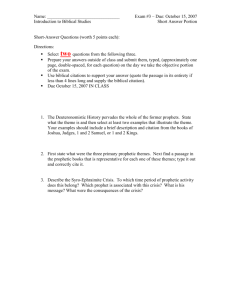Foundations of biblical community
advertisement
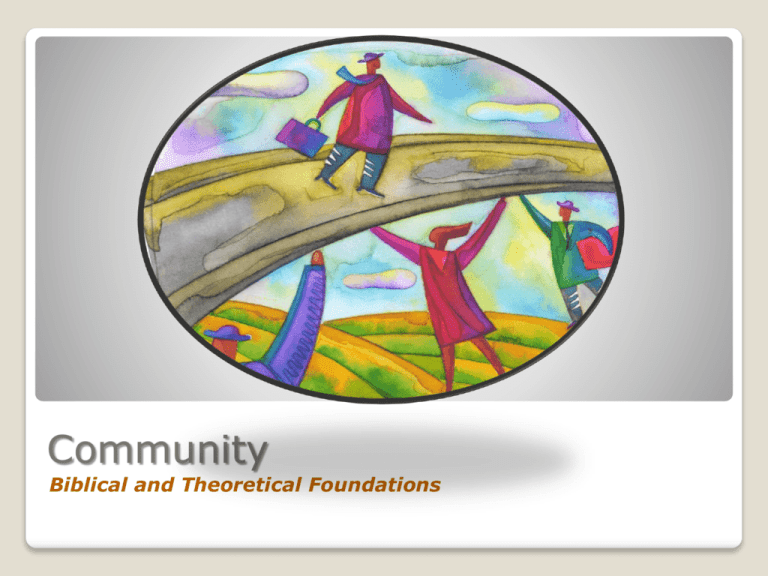
Community Biblical and Theoretical Foundations True community begins with a biblical understanding of love Longsuffering: what love is • Greek meaning is “patience” or the act of bearing with someone. • OT – Describes God • Ex 34:5-7 • Ps 103:8-13 • Jonah 4:2 • NT – Since God has been patient with us, we should be patient with one another. True community begins with a biblical understanding of love Descriptions of “longsuffering” in the negative sense • Love is not easily provoked or not easily drawn into anger. • Love thinks no evil. • Love is not envious. Kind – what love does • OT – Describes God and is usually partnered with “longsuffering.” • NT – Believers are to love as God loves. Therefore, believers are to be kind and bear the stamp of the Holy Spirit by displaying kindness as a fruit of the Spirit’s presence. • Gal 5:16-25 • Eph 4:29-32 Descriptions of “kindness” in the negative sense • Love is not boastful, proud, or arrogant. • Boasting – intellectual pride emphasized through speech • Arrogance – action or the way boasting comes across • Pride – seeks to build itself up by tearing others down • Love is not rude. • Love is not self-seeking. Foundations of biblical community Marion K. Rich – The early Christians were often together around the teachings of Christ—the word, prayer, the sacraments. They were together to share their common life in Jesus. Somehow we need to rediscover the life the early Christians shared together—the kind of fellowship that gets deeper than football scores and the latest fashions. Foundations of biblical community Albert J. Wollen – In 1965, Dr. Francis Schaeffer made the following comment about the future of the church: “Unless the church changes its forms and gets back to community and sharing of lives personally, the church is done.” Foundations of biblical community Larry Crabb – A central task of community is to become a place safe enough for each of us to own our brokenness. Only then can the power of connecting do its job. Only then can community be used of God to restore our souls. Foundations of biblical community Gilbert Bilezikian – Community is deeply grounded in the nature of God. It flows from who God is. Because he is community, he creates community. It is his gift of himself to humans. Foundations of biblical community Les Steele – By gathering followers around him, Jesus implicitly affirmed that participating in community plays a central role in maturing. Community in the NT – the “one anothers.” Foundations of biblical community Spiritual vs. Unspiritual Community Conflicted relationships met by Spiritual Friendships (Care of the Soul) Spiritual vs. Unspiritual Community Conflicted relationships met by Spiritual Friendships (Care of the Soul) Conflicted relationships handled by Congenial Relationships, Cooperative Relationships, and Consoling Relationships. Spiritual vs. Unspiritual Community And, as needed, Spiritual Direction (Cure of the Soul) Spiritual vs. Unspiritual Community And, as needed, Spiritual Direction (Cure of the Soul) And, as needed, Counseling Relationships or Conforming Relationships Spiritual vs. Unspiritual Community Characterized by Dependence on the Spirit (Listening to God through word and spirit) Spiritual vs. Unspiritual Community Characterized by Dependence on the Spirit (Listening to God through word and spirit) Characterized by Dependence on the Flesh Spiritual vs. Unspiritual Community Barriers to Community Antonyms of Community • Disparity • Difference • Dissimilarity • Disagreement • Conflict • Private/Personal • Individual Barriers to Community Antonyms of Community Synonyms of Community • Disparity • Difference • Dissimilarity • Disagreement • Conflict • Private/Personal • Individual • Nurtured • Nourished • Sustained • Strengthened • Educated • Discipled • Corporate Barriers to Community What is necessary to incorporate the principles of biblical love with biblical community? Exercise in Groups Community Pauline Foundations for Community and Small Groups Biblical Context Pauline assertions must be linked to the context in which he was speaking and acting Biblical Context Pauline assertions must be linked to the context in which he was speaking and acting Christians in those communities were conditioned by society Biblical Context Through interaction with society and with his communities, Paul came to hold the views expressed in his letters (Banks, 6) Pauline assertions must be linked to the context in which he was speaking and acting Christians in those communities were conditioned by society Biblical Context Paul’s understanding of community Never static or frozen into a theological system Paul’s understanding of community Never static or frozen into a theological system Living thing, always open to development Paul’s understanding of community Never static or frozen into a theological system Living thing, always open to development Has movement, in touch with the practicalities of the moment Paul’s understanding of community Three types of community Politeia – the public life of the city or state Three types of community Politeia – the public life of the city or state Oikonomia – the household order into which they were born or to which they were attached Three types of community Politeia – the public life of the city or state Koinonia – voluntary associations that multiplied in cities all over the ancient world Oikonomia – the household order into which they were born or to which they were attached Three types of community http://catholicresources.org/Bible/EpistlesHouseholdCodes.htm http://www.krusekronicle.com/2007/09/h ousehold-new-t.html Household “codes” Head of Household Heir Wife Children Servants Slaves The picture of family as community Koinonia Based in something other than the principles of politeia or oikonomia Koinonia Based in something other than the principles of politeia or oikonomia Bound together people from dissimilar backgrounds on a different basis than geography, race, or natural and legal ties Koinonia Based in something other than the principles of politeia or oikonomia Bound together people from dissimilar backgrounds on a different basis than geography, race, or natural and legal ties Met a variety of needs—social, charitable, and funerary Koinonia Based in something other than the principles of politeia or oikonomia Bound together people from dissimilar backgrounds on a different basis than geography, race, or natural and legal ties Met a variety of needs—social, charitable, and funerary Participants found personal points of reference and experienced a sense of community Koinonia Koinonia for followers of Christ •Willing participation with God in his work in the world alongside one another Missional sense of community Ekklesia Voluntary association with regular gatherings Ekklesia Voluntary association with regular gatherings Ekklesia Relatively small group of likeminded people Voluntary association with regular gatherings Combination of the three models of community Ekklesia Relatively small group of likeminded people Ekklesia Voluntary association with regular gatherings Relatively small group of likeminded people Combination of the three models of community Through gathering, the community comes into being and is continually recreated (Banks, 46)

